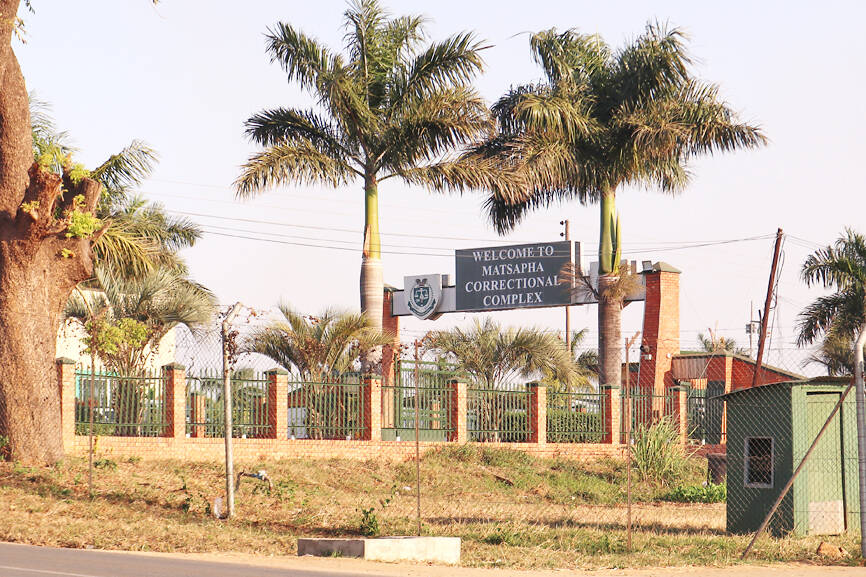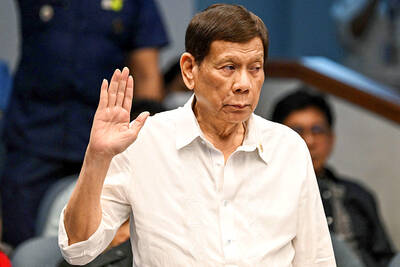Civil society and opposition groups in Eswatini have expressed outrage after the US deported five men to the country, with the largest opposition party calling it “human trafficking disguised as a deportation deal.”
The men, from Vietnam, Jamaica, Laos, Yemen and Cuba, were flown to the small southern African country, an absolute monarchy, last week as the US stepped up deportations to “third countries” after the US Supreme Court cleared them last month.
Eswatini, formerly Swaziland, is landlocked by South Africa and Mozambique and has a population of about 1.2 million. It is Africa’s last absolute monarchy and has been ruled by King Mswati III since 1986.

Photo: AP
The government estimated the five men would be held for about one year, Eswatini Assistant Government spokeswoman Thabile Mdluli said, adding that “it could be slightly less or slightly more.”
She said that Eswatini is ready to receive more deportees, depending on the availability of facilities and negotiations with the US, which has also deported eight people to South Sudan after holding them for weeks in a shipping container in Djibouti, and more than 200 Venezuelans to El Salvador.
Officials have said the men, who were put in solitary confinement, were safely imprisoned in Eswatini. However, they have refused to disclose the terms of the deal, other than to say the US was footing the costs of keeping the men locked up and that they would work with international organizations to deport them to their home countries.
CIVIL OPPOSITION
Many civil society organizations and politicians were not convinced.
“This action, carried out without public consultation, adequate preparation, or community engagement, raises urgent questions about legality, transparency, and the safety of both the deported individuals and the people of Eswatini, especially women and girls,” a coalition of seven women’s groups said.
The organizations delivered a petition to the US embassy in Eswatini on Monday last week, calling for the US to take back the deportees, the deportees’ human rights to be respected and Eswatini not to become a “dumping ground for unresolved problems from elsewhere.”
The groups’ leaders held a protest outside the US embassy on Friday, where they sang, danced and held up signs with messages including: “Whose taxpayers?” “Eswatini is not a prison for US rejects” and “Take the five criminals back to the US.”
OPPOSITION PARTY
Eswatini’s largest opposition party, the People’s United Democratic Movement (Pudemo), said in a statement: “Pudemo vehemently condemns the treacherous and reckless decision by King Mswati III’s regime to allow the United States of America to dump its most dangerous criminals on Swazi soil.”
“This is not diplomacy, but human trafficking disguised as a deportation deal. It is an insult to all Emaswati who value peace, security, and the sanctity of our homeland,” it said.
The coordinating assembly of non-governmental organizations, an umbrella group, said the situation was “deeply alarming” and condemned the “stigmatizing and dehumanizing language used by US officials.”
It called for the Eswatini-US agreement to be made public and to be suspended pending “genuine public consultation and transparent national dialogue.”
US Department of Homeland Security Assistant Secretary Tricia McLaughlin wrote on X on July 16 that the men, who she said had been convicted of crimes including child rape, murder and burglary, were “so uniquely barbaric that their home countries refused to take them back.”
“These depraved monsters have been terrorizing American communities, but ... they are off American soil,” she added.
GOVERNMENT STATEMENT
Eswatini Prime Minister Russell Dlamini told local media on Friday that the government was confident it would safely manage the prisoners.
“Eswatini is currently holding inmates who have committed more dangerous crimes than those attributed to the five deportees,” he said.
A prison service spokesperson said the country’s citizens should not be afraid.
“We can confirm that the five inmates in question have been admitted to one of our high-security centers where they are responding very well to the new environment,” Eswatini Correctional Services deputy public relations officer Baphelele Kunene said.
“Even though they come from the US, there is no preferential treatment for them as they are guided by the same prison regulations, eat the same food as others and are also expected to exhibit the same and equal amount of respect for prison protocols,” he said.
HUMAN RIGHTS
The US Department of State’s most recent human rights report on Eswatini, in 2023, said there were “credible reports of: arbitrary or unlawful killings, including extrajudicial killings; torture and cruel, inhuman, or degrading treatment or punishment by the government; serious problems with the independence of the judiciary; [and] political prisoners or detainees.”
Political parties are banned from taking part in elections, which the system’s advocates say makes lawmakers more representative of their constituents.
In September last year, Pudemo leader Mlungisi Makhanya was allegedly poisoned in South Africa. The party said it was an assassination attempt, which Eswatini’s government has denied.

FEROCIOUS FISH-EATER Scientists have found a new species of dinosaur from the Cretaceous Period, a ‘hell heron’ that stalked the rivers, deep in the Saharan desert At a remote Sahara desert site in Niger, scientists have unearthed fossils of a new species of Spinosaurus, among the biggest of the meat-eating dinosaurs, notable for its large blade-shaped head crest and jaws bearing interlocking teeth for snaring fish. It prowled a forested inland environment and strode into rivers to catch sizable fish like a modern-day wading bird — a “hell heron,” as one of the researchers put it, considering it was about 12 meters long and weighed 5-7 tons. The dinosaur presented a striking profile on the Cretaceous Period landscape of Africa some 95 million years ago as it hunted

‘COST OF DEFECTION’: Duterte’s announcement could be an effort to keep allies in line with the promise of a return to power amid political uncertainty, an analyst said Philippine Vice President Sara Duterte yesterday announced she would run for president of the Southeast Asian nation of 116 million in 2028. Duterte, who is embroiled in a bitter feud with Philippine President Ferdinand Marcos Jr, was impeached last year only to see the country’s Supreme Court throw the case out over procedural issues. Her announcement comes just days before her father, former Philippine president Rodrigo Duterte, begins a pretrial hearing at the International Criminal Court (ICC) in the Netherlands over crimes against humanity allegedly committed as part of a brutal crackdown on drugs. “I offer my life, my strength and my future

NOT YET THERE: While the show was impressive, it failed to demonstrate their ability to move in unstructured environments, such as a factory floor, an expert said Dancing humanoid robots on Monday took center stage during the annual China Media Group’s Spring Festival Gala, China’s most-watched official television broadcast. They lunged and backflipped (landing on their knees), they spun around and jumped. Not one fell over. The display was impressive, but if robots can now dance and perform martial arts, what else can they do? Experts have mixed opinions, with some saying the robots had limitations and that the display should be viewed through a lens of state propaganda. Developed by several Chinese robotics firms, the robots performed a range of intricate stunts, including martial arts, comedy sketches and choreographed

DRUG WAR: The former president said there was no campaign to kill addicts, but his speeches called for violence and told police to use lethal force if necessary Former Philippine president Rodrigo Duterte earned global infamy for the deadly drug crackdown that led to his arrest over crimes against humanity charges, despite his huge popularity at home. A profane-lipped populist and self-professed killer, Duterte’s anti-crime campaign resulted in the deaths of thousands of alleged dealers and addicts. Rights groups said many of those killed were poor men, often without any proof they were linked to drugs. Yet, while drawing condemnation abroad, tens of millions of Filipinos backed his swift brand of justice — even as he joked about rape in his rambling speeches, locked up his critics and failed to